Dental Implants — Dallas, TX
The Best Solution for Missing Teeth
Dental implants are the premier treatment option for one or more missing teeth. They have evolved over the past fifty years to become widely regarded as the best solution for missing teeth. It doesn’t matter if you need to replace one tooth or your entire arch, Dr. Anver and his team can make your dream smile a reality! Don’t wait to learn more about the process, keep reading or give our oral surgery office a call to get started with replacing missing teeth with dental implants in Dallas, TX!

Take Our Dental Implant Assessment
Why Choose Texas Wisdom Teeth and Dental Implants for Dental Implants?
- State-Of-The-Art Dental Technology for Precise Treatment
- In-House Dental Implant Placement & Restoration
- Experienced Oral Surgeon with Personalized Touch
What Are Dental Implants?

A dental implant is a titanium post that is placed into the jawbone in much the same position as a natural tooth root. Titanium is a biocompatible material, which helps the bone adhere to the implant during the healing process. Approximately two to six months after initial placement, the implant should be fully integrated into the jawbone and feel as sturdy as a natural tooth root. At this point, the implant is ready for a restoration. Dr. Anver will place a custom-made dental crown, bridge, or denture permanently into the implant "root," depending on how many teeth you’re missing. The end result will look, feel, and function just like a natural smile.
The 4-Step Dental Implant Process

Unlike traditional methods of tooth replacement, getting dental implants in Dallas requires a multi-step process that takes several months to complete. Although that may seem like a long time, every patient finds the incredible benefits to be well worth the time and effort. Since Dr. Anver is able to perform the entire dental implant treatment from start to finish, you don’t have to worry about visiting an outside specialist. Our team will be right by your side every step of the way! While every patient’s treatment will look slightly different, there are four main steps you can expect. Let’s take a closer look at what each one entails.
Initial Dental Implant Consultation

The first step on your journey towards a newly rebuilt smile is a consultation with our team. Using cutting-edge dental technology, Dr. Anver will review your oral health and medical history to ensure you’re a good candidate for dental implants in Dallas. Depending on your unique case, you may need to complete preliminary procedures like gum disease treatment, tooth extractions, or bone grafting. Once that’s taken care of, you can schedule your dental implant surgery.
Dental Implant Surgery

Although dental implant surgery may sound daunting, it’s actually a fairly simple process! Before starting the procedure, Dr. Anver will numb your mouth thoroughly to ensure you’re completely comfortable. Then, he’ll make small incisions in the gum tissue to access your jawbone. After each implant post is inserted at precise locations and angles, your gums will be sutured shut, and a protective cap will be placed over them to keep your smile safe throughout the healing process.
Dental Implant Osseointegration & Abutment Placement

It’ll take about three to six months for osseointegration (the natural process that allows your implant posts to merge with the jawbone) to take place. Once it’s complete, you’ll return to the office for a second surgery to receive your abutments. These are the small metal connector pieces that are placed on top of your implants, designed to hold your new crown, bridge, or denture into place.
Delivery of Dental Implant Restorations

A trusted dental laboratory will create your final restorations using impressions of your smile. Your replacement teeth will be made of natural-looking materials that closely resemble your original tooth enamel. Once they’re attached to your abutments, you’ll be ready to enjoy a complete, fully functioning that same day!
Benefits of Dental Implants

Dental implants in Dallas are often considered the gold standard for replacing missing teeth, and several patients these days turn towards them to assist their needs; in fact, over half a million dental implants are placed each year! Thanks to their unique placement inside the jawbone via surgery, this modern tooth loss solution also provides a wide array of important benefits that you simply don’t have access to through options like dentures or bridges. Keep reading to learn a little more about several of the life-changing benefits that dental implants have to offer, or feel free to give us a call to request additional information or to schedule a consultation.
Day-to-Day Benefits

Upgrading your smile with dental implants can offer several day-to-day benefits such as:
- The ability to eat most foods – Dental implants replace the entire structure of a missing tooth, both above and below the gumline. This means they’re much more stable compared to traditional bridges and dentures and can withstand virtually any type of food.
- Increased confidence – Dental implant restorations are carefully designed to complement a patient’s natural facial aesthetics and are nearly identical to natural teeth.
- Improved speech – It’s not uncommon for patients with dentures to experience difficulty speaking due to their prosthetic slipping and sliding around. Dental implants are secure enough to enable you to speak clearly and with confidence.
- Easy oral hygiene – Dental implants aren’t difficult to clean or complicated to maintain at all, and you simply need to care for them as you would your natural teeth.
Health Benefits

In addition to improving your daily quality of life, dental implants offer several awesome health advantages including:
- Jawbone preservation – Dental implants provide the jawbone with a sufficient amount of internal support. This prevents the bone loss that commonly occurs following tooth loss, and also helps maintain the face’s overall shape.
- Protection for natural teeth – Dental drift (shifting of the teeth) is common after tooth loss, but fortunately, dental implants serve as placeholders to ensure that every single one of your pearly whites stays in their proper position.
- Improved overall health – Studies have shown that there’s a correlation between tooth loss and an increased risk of several diseases. But since dental implants are the next best thing to natural teeth, it’s safe to assume that they also might help to lower these risks.
Long-Term Benefits

Of course, there are also many long-term benefits that can be enjoyed by patients with dental implants:
- Impressive success rate – Dental implants boast an impressive success rate of around 95%, even after 10 years!
- Youthful appearance – Since dental implants provide healthy stimulation to your jaw, they prevent it from deteriorating. This helps your face to ultimately appear fuller and younger.
- Long-lasting results – Unlike dentures or bridges, dental implants can easily last for decades without needing replacement.
Who Dental Implants Can Help

Dental implants are one of the most versatile tooth replacement options in dentistry to date. Replacing one tooth or an entire row of teeth has never been easier thanks to this technology. Consider the differences below!
Missing One Tooth

A traditional three-unit dental bridge can be used to replace a missing tooth, but there are several factors to consider when reviewing this option. A fixed bridge requires the grinding down of the two adjacent teeth on either side of the missing tooth. The prognosis for the longevity of a dental bridge is five to fifteen years. On the other hand, a single tooth implant does not require the grinding down and crowning of the adjacent natural teeth. The single tooth implant is placed in the area of the missing tooth and essentially replaces the natural tooth root. A crown is constructed upon the dental implant, and no other teeth are affected. The bone in the area of the missing tooth is preserved and does not recede. This is especially important if the missing tooth is located in the "aesthetic zone," or smile line. The single tooth implant functions the same as a natural tooth and does not decay. The prognosis for longevity of a single tooth implant is 97% over 48 years.
Missing Multiple Teeth

Other solutions you may be considering for the treatment of multiple missing teeth are dental bridges or removable partial dentures. Most non-implant options for multiple tooth replacement will be effective in some cases, but not as long-lasting and functional as dental implants. Traditional removable partial dentures will use metal clasps to hook onto the adjacent natural teeth. Multiple tooth replacement with dental implants is an option that will preserve the adjacent natural teeth and prevent the loss of jawbone structure in the areas where implants are placed. Instead of removing existing tooth enamel to anchor the bridge, the implants do all the work, making it ideal for those trying to protect their existing tooth enamel.
Missing All Teeth

Dentures are not without their downsides. Many people find that they’re no longer able to fully enjoy all of their favorite foods, and they are often annoyed with how their new teeth continually slip and move around in their mouths. The denture stabilization process helps eliminate these disadvantages. We simply place a strategic number of dental implants in your mouth to anchor your dentures in place, thus improving chewing capabilities and lowering the risk of future slipping. You may also be a candidate for All-on-4/ All-On-6 implant dentures, which let you walk out of our oral surgery office with a new smile the same day as your surgery and require less jawbone density.
Learn More About Full Mouth Dental Implants
Learn More About All-On-4/6 Dental Implants
Understanding the Cost of Dental Implants

There is no set cost of dental implants because the price is based on your individual treatment plan. As a result, what your friend or neighbor paid for their procedure will not be the same as what you must pay. During your initial consultation, we will take the time to explain the cost of your new smile. You may end up paying several thousand dollars.
With that said, it cannot be stressed enough how good of a long-term investment dental implants can be. Plus, we accept dental insurance and offer special pricing to help you afford your care!
Preliminary Treatments & Dental Implant Surgery

Many patients require gum disease treatment, one or more tooth extractions, or a bone graft before they qualify for dental implants. All such procedures come with their own price tag.
The dental implant placement surgery incurs a separate fee, which depends on the number of implants being inserted and other factors. Dr. Anver is an expert at this procedure, and our team always strives to charge fair prices for any service that we provide.
The Parts of Your Dental Implant

Some aspects of the dental implant procedure that can influence the cost of your care include:
- The number of implants needed. Logically, more implants lead to higher fees
- The type of implants. Implants come from various manufacturers and can be made out of different materials. They also come in a range of sizes.
- The size and type of your final restoration. A single crown costs less than a multi-unit bridge or full-arch denture.
If you have questions about where your implants come from, feel free to ask. We strive to use only top-quality materials in our practice.
How Dental Implants Can Save You Money

Dental implants might seem quite expensive at first. However, they are an excellent investment because they can end up saving you money in the long run. For example, they have the potential to last a lifetime. Dentures, on the other hand, may need to be replaced every five – seven years. Over time, they can become a financial burden. Conversely, if you calculate the cost of dental implants per day over the course of a few decades, they usually end up being more affordable than a daily trip to your favorite espresso shop!
Does My Dental Insurance Cover Dental Implants?
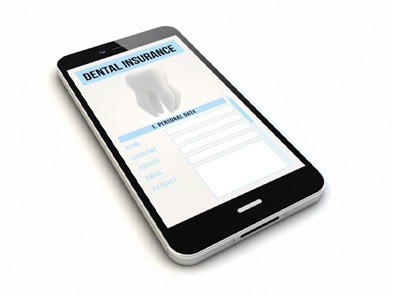
Dental insurance plans vary greatly in their approach to dental implants. Some cover them, while others do not. You will have to look at your unique policy to see how it applies. Regardless of what type of plan you have, you can rely on us to help you use your benefits in the most advantageous way possible. Even if your plan does not cover the implants themselves, it is likely to cover your preliminary care and/or your final restoration.
Making Dental Implants Affordable

As your implant dentist, we want to help you afford your care: Here are some useful provisions that you may be able to take advantage of:
- We are partnered with CareCredit, a third-party lender that provides low-interest payment plans for dental services. Upon approval, you may be able to choose from between several monthly payment amounts.
- Promotional pricing. Patients without insurance can take advantage of our special dental implant offers .
Dental Implant Post-Op Instructions

After your dental implants have been placed, the recovery period begins. We will let you know what you can expect, which symptoms are normal, and how you can help your smile heal. If you are ever experiencing intense, abnormal pain or other side effects that seem strange, don’t hesitate to give us a call. Then we can give you further instructions.
What to Do Directly After Dental Implant Surgery

The most important thing for you to do is leave the forming blood clot untouched so the health happens smoothly. When the area is healing, remember the following things:
- Don’t spit! Instead, use a tissue or swallow your saliva.
- You shouldn’t use a straw to drink liquids.
- Don’t smoke immediately following your procedure.
- Refrain from touching the surgical site with your tongue or fingers.
Common Side-Effects When Recovering from Dental Implant Placement

Some mild side effects are to be expected – especially in the first few days after your procedure. They may include:
- Bleeding: This can go on for several days. Gauze and light pressure can be used to lessen this.
- Swelling: For the first 72 hours, inflammation is common. Use a cold compress to reduce this.
- Soreness: Your recommended over-the-counter and/or prescribed pain relievers should be enough to address any discomfort.
All of these side effects should be temporary and gradually subside. If you have any concerns or they don’t seem to be going away, give us a call so we can give you further instructions.
Your Diet After Dental Implant Surgery

For the first few days after the surgical placement of your implants, we recommend that you stick to a soft-food diet. Here are some food options that you can enjoy during the initial healing process:
- Mashed potatoes
- Soup
- Yogurt
- Pudding
- Scrambled eggs
- Ice cream
- Pasta
Once you feel comfortable enough to do so, you may transition back to your normal diet. Just remember to limit crunchy and tough foods. You should also avoid chewing directly on the site of your new dental implant(s).
Post-Op Health & Oral Hygiene

The day after your surgery, you can brush your teeth like you normally do, but be careful near the surgical site. Rinse your mouth after meals with salt water to keep the area clean. If you were provided with a prescription mouthwash, use that as directed. When using mouthwash, make sure you choose one that does not contain alcohol as it can aggravate the healing site.
What to Do After Your New Teeth Are Attached

After your teeth have been attached, the difficult part is over! When your new crown, bridge, or denture is attached to your implants, you may experience some temporary sensitivity in the gum disease, but this should be easy to control with pain medication. There shouldn’t be any swelling, bleeding, or extensive recovery at this time. Now you can leave the office showing off your new and improved smile!
Dental Implant Technology

Our team at Texas Wisdom Teeth and Dental Implants is dedicated to delivering top-notch implant care. Staying on top of the latest research and undergoing continuous training on our treatments is a crucial aspect of our commitment. Equally important is the role of technology in our practice. The advanced tools in our office play a pivotal role in ensuring we provide the exceptional service you've come to expect. Below, you can learn more about the cutting-edge dental implant technology we use in Dallas.
iCat 3D Scanner
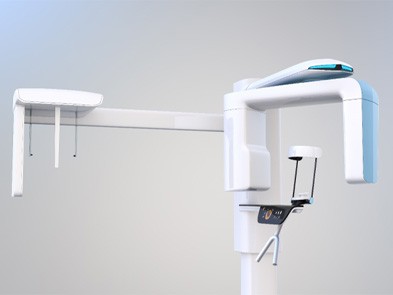
While digital X-rays allow us to view hidden oral structures, they have limits. To avoid surprises during dental implant placement, we use an iCat 3D Cone Beam CT scanner. Unlike digital X-rays, this device produces a 3D scan of your mouth with minimal radiation. It contains intricate details like nerve pathways, blood vessels, and jawbone thickness. With this information, we can precisely plan the placement of your dental implants to enhance the likelihood of long-term success while minimizing unexpected issues.
Xnav Guided Dental Implant Surgery
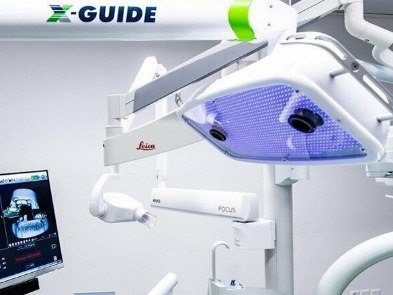
Precision is crucial in all dental implant cases, but some more than others. For instance, missing all teeth in a single arch will make the process difficult due to the lack of landmarks. To address this, we use Xnav, a dynamic navigation system.
This cutting-edge technology offers precise control over implant placement – guiding our dentists with accuracy in position, angle, and depth. This not only enhances treatment comfort, but may also reduce swelling and bruising. With Xnav, our patients experience minimally invasive surgery, ensuring optimal control and efficient recovery with smaller incisions.
Itero Digital Impression System
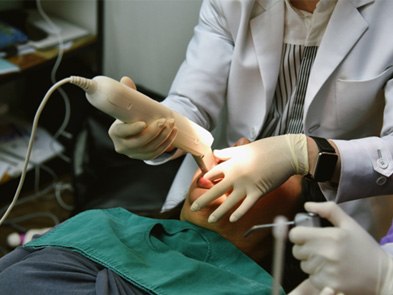
Our Itero Digital Impression System is an intraoral scanner that redefines accuracy and comfort. We use Itero to capture highly detailed scans of teeth, bites, and tissue, eliminating the discomfort of traditional putty impressions. No more goopy molds! This advanced technology allows us to plan cases, print dental models, and digitally craft teeth with precision. You can look forward to a more comfortable and aesthetically pleasing dental journey with Itero.
Advanced Dental Implant Procedures
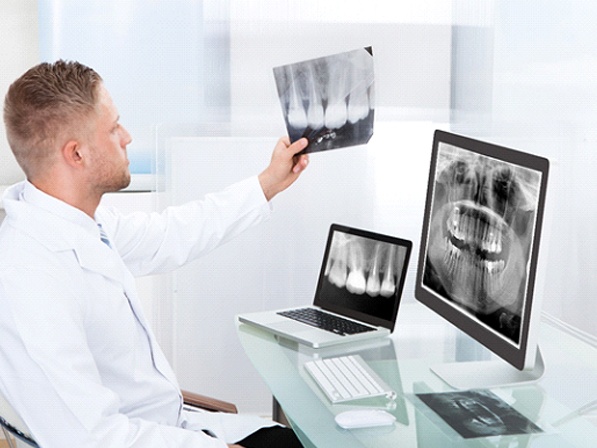
In order for dental implants to last for decades, there must be a proper foundation for them to rely on ahead of surgery. Just like how a house needs foundation to remain stable and resilient to the elements, dental implants need strong and healthy bone tissue to keep their root in place. Not only does this ensure proper osseointegration (or fusing) of the titanium post to the jawbone, but it also ensures the restorations remain secure.
Dr. Anver is no stranger when it comes to advanced dental implant procedures that make your future tooth replacement possible. If you need a little help becoming a good candidate for treatment, he’s happy to offer bone grafts, sinus lifts, and PRP/PRF treatment to get it done. Keep reading or give us a call today to learn more!
Bone Grafting
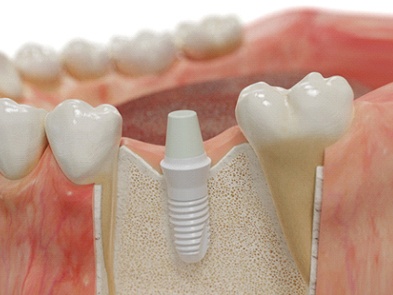
Once the implants have been placed into the jaw, you should expect them to take anywhere between three and six months to fully integrate. This process, known as osseointegration, is both essential and necessary to keep the dental implant healthy. Without it, dental implants cannot even be considered.
At your initial consultation, Dr. Anver captures X-rays and CT scans to confirm if enough bone tissue is present in the jaw for an implant to integrate. If this is not the case, he’ll likely recommend a bone graft first. Bone grafts work by taking bone minerals from other areas of the body (or a donor if needed), then placing them into the deteriorated portions of the jaw. These minerals will take several months to integrate. By the end of this process, your jawbone should be thick enough to receive a dental implant with confidence.
Sinus Lifts
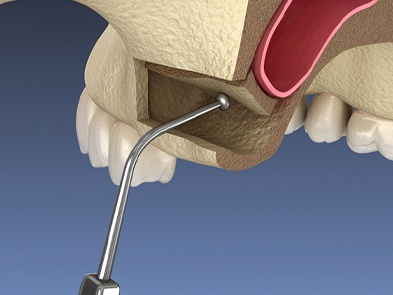
It’s no secret that placing dental implants in the upper back jaw is a more complicated process. This is mainly due to the fact that bone density is lower in this area due to its proximity to the sinuses. In cases like these, Dr. Anver may recommend a sinus lift. During this procedure, we lift the sinus membrane slightly in order to pack additional bone grafting material into the newly created space. This makes the jawbone much thicker and gives dental implants a proper foundation to fuse in. Once it has fully healed, your upper jaw should be ready to receive a dental implant. Just keep in mind that they can take anywhere between four and 12 months to complete.
PRP/PRF Treatment
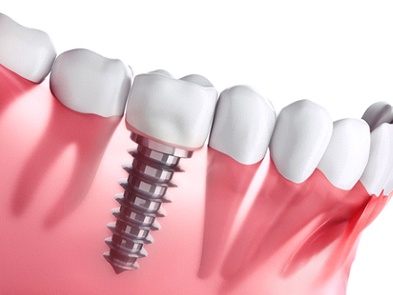
The better your body heals after you’ve received a dental implant, the better off you’ll be. In fact, this is the best way to determine just how successful your dental implant surgery was. To ensure the best recovery process possible, our office performs a procedure known as PRP treatment, which stands for platelet-rich plasma. During this procedure, we inject platelets into the tooth socket to dramatically accelerate the healing process. By doing so, we can speed up the recovery time and get you a dedicated restoration sooner. It also means we can lower the risk of infections or other complications. We also offer PRF treatment, which stands for platelet-rich fibrin, a second-generation PRP treatment.
Maintaining & Caring for Your Dental Implants

Dental implants in Dallas have the potential to last a lifetime! In fact, most patients’ implants are still thriving after 10 years — and that’s really just the beginning of what they can accomplish. They can help you enjoy a healthy smile and a wide variety of foods as you go through all of life’s big and little moments. Of course, their longevity is not guaranteed. Just like natural teeth, they require some maintenance if they are going to stand the test of time.
Make Oral Hygiene a Priority

Dental implants cannot get cavities, but that doesn’t mean you should not pay attention to oral hygiene. Maintaining a clean mouth is of vital importance because the most common cause of dental implant failure is an infection called peri-implantitis. It occurs when harmful bacteria invade the tissue around an implant. You can greatly reduce your risk of peri-implantitis by:
- Brushing your teeth at least twice a day . Use a soft-bristled brush, and be sure to pay extra attention to the area along your gumline.
- Flossing once a day . If you have an implant bridge or denture, you cannot floss between the teeth that are attached to one another. However, you can still floss between your natural teeth. You might also be able to floss beneath your implant restorations.
- Rinsing with an antibacterial mouthwash . Your dentist or hygienist might have recommendations on which product you should use.
Eat a Healthy Diet

Both natural teeth and dental implants can stand up to most foods — but there is no denying that some food choices are wiser than others. It’s best to limit your consumption of anything that is extremely hard, sticky, sugary, or acidic. Overindulgence in such foods can foster bacteria growth and damage your implants. Instead, try to center your diet on tooth-friendly foods, such as those that are rich in calcium and antioxidants like vitamin C.
Break Bad Habits

There are a number of bad habits that can be detrimental to dental implants:
- Tobacco use is associated with a greatly increased risk of dental implant failure.
- Using teeth as tools. Your restorations may suffer damage if you use them to open packages or trim your fingernails.
- Chewing on hard objects. Munching on ice or chewing on pen caps can cause premature wear and tear to your restorations.
Protect Your Dental Implants
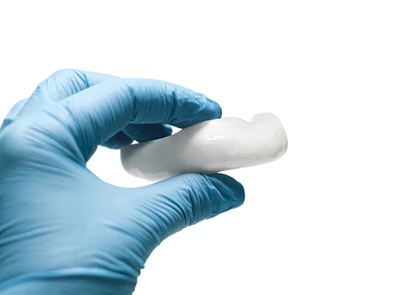
Do you like to play sports? If so, be sure you invest in a high-quality mouthguard to protect both your oral tissues and your dental implants. A custom guard from a dentist provides better protection and comfort than any that you can purchase over the counter.
If you often wake up with a sore jaw, you might be grinding and clenching your teeth at night. That can damage your implants. Tell your implant dentist in Dallas about your problem. They may provide a nightguard to protect your smile while you sleep.
Schedule Regular Dental Checkups
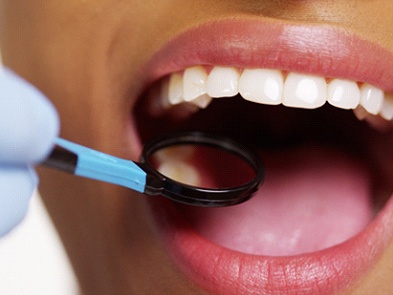
At your regular dental checkups, your dentist will examine both your natural teeth and your dental implants. If they spot any cause for concern, they may be able to address it before it becomes serious. Your implant restorations may also be removed so the area around the abutments can be thoroughly cleaned. If you ever notice a problem with your dental implants, such as signs of an infection, you should call us or your general dentist immediately.
Dental Implant FAQs
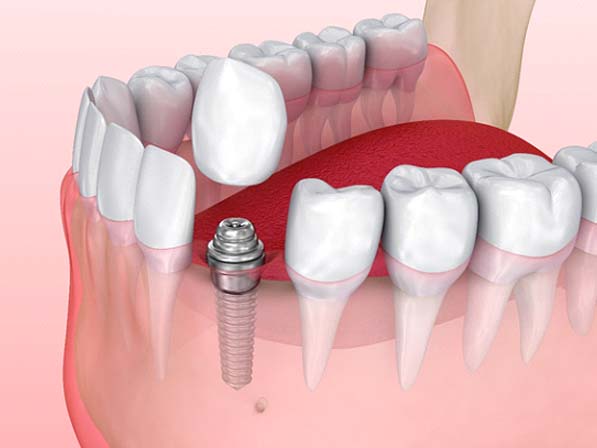
Getting dental implants is a long-term investment, and the process itself will require multiple appointments. Before moving forward, we want to completely clear up any doubts or concerns you may have. If you have a question about dental implants or the overall process, we want to know! Below, you’ll find a number of questions that we’ve often heard from our patients; if you have any concerns that aren’t listed there, we invite you to call us and let us know.
Does It Hurt to Get Dental Implants?
The procedure itself shouldn’t cause pain since your mouth will be thoroughly numbed. You can also be sedated for the surgery in order to stay relaxed. Afterwards, it’s normal to experience some soreness and discomfort, but over-the-counter painkillers and the occasional application of an ice pack can help make the recovery process much more comfortable.
What Is the Healing Process for Dental Implants?
You’ll notice some swelling and soreness for the first few days, but this should fade quickly. During this initial recovery period, you should stick to soft foods and avoid hot liquids or drinking from a straw. You can return to normal activities after just a few days, but it will typically take months for your jawbone to fully integrate with the implants.
Can I Have All My Teeth Replaced With Dental Implants?
Indeed, you can! Dental implants are highly versatile and can be used to replace any number of teeth. We can even replace an entire arch with an implant-retained denture! You won’t necessarily need an implant to replace every individual tooth; full dentures can typically be supported by four to eight dental implants.
How Long Do Dental Implants Last?
Like most forms of tooth replacement, the lifespan of dental implants depends on your ability to care for them properly and maintain good oral health. Dental implants are designed to last for 30 years, but most patients can easily count on them to last a lifetime.
What Are the Benefits of Getting Dental Implants from a Surgeon vs. a Regular Dentist?
Oral surgeons have undergone additional training in implant placement and other procedures, giving them a level of expertise that regular dentists are often unable to match. Also, oral surgeons are typically exposed to a wider variety of complications during surgeries, meaning they’re more likely to be able to deal with these problems effectively as they occur.

